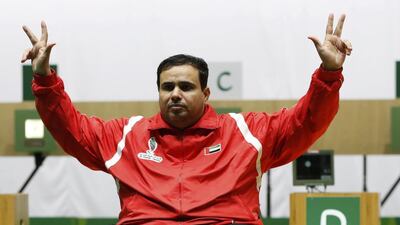Fresh from winning three silver medals at the Paralympic Games in Rio, Abdullah Sultan Al Aryani has a new project to keep him busy: Constructing a trophy cabinet to display his achievements.
In sheer quantity, the Emirati marksman is now the most decorated athlete in UAE history after adding a trio of runner-up medals to the gold he won in the mixed 50-metre rifle prone at London 2012.
Add to that four Asian Paralympics and four world championship medals and it is easy to understand why the black bumbag he carries them in is no longer a feasible option.
See more on 2016 Paralympic Games:
• Mohammed Al Hammadi sets new Paralympic Games record in T34 800m to win UAE's second gold
• Volunteers get hands on for inaugural para-triathlon
• UAE shooter Abdullah Sultan Al Aryani wins his third silver medal of Games
• UAE's Mohammed Khalaf 'younger than ever' after winning powerlifting gold
“Everywhere I go, I take them with me,” he says producing two silver Rio 2016 medals from the waist pack. “But now I will build something in the corner of my room back home. Something to display them all.”
Al Aryani's four Paralympic medals is one more than Mohammed Al Hammadi, whose gold on Wednesday night in the men's 800m T34 final complements the silver and bronze from London's 200m and 100m events.
Mohammed Khalaf, meanwhile, added a second powerlifting gold to the one he secured in Athens 12 years ago as well as a silver in Beijing to sit higher in the individual medals table but with less silverware overall.
“For me, we are not in competition,” Al Aryani said.
“We are all here for our country and the entire delegation is happy when one of us wins, especially as it is this week aligned with the Eid holiday and a great chance to give something for our country and our people on this special occasion.”
Such Paralympic accomplishments are a far cry from the Emirates’ record at the Olympic Games, where Sergiu Toma, a Moldovan-born judoka, won the UAE only its second medal in history when he claimed bronze in Rio last month.
Al Aryani, who competed at the 1996 Olympics before being rendered paralysed in a 2001 car crash, sits in silence for a prolonged time when asked about the country’s contrasting achievements.
“To develop an athlete for the Olympics is not an easy job,” he finally says.
“To produce an athlete who can compete as one of the best in the world, especially considering the number of people in the UAE, is very tough.
“But in the Paralympics, we have more of a chance because of the different disabilities and classifications. There is a certain level of fairness and a good opportunity to compete for medals.”
The statistics back up his claims.
At the Rio Olympics, with 11,544 athletes fighting for a share of 2,102 medals, the athlete-medal ratio was 5.5:1, whereas at this month’s Paralympics, 4,346 athletes are contesting 2,347 medals, producing a more favourable ratio of 1.85:1.
Yet, while 58 different countries have so far won gold at the Paralympics, a record 59 national anthems were played at last months Olympics.
The UAE is 32nd in the Paralympics medal table with two golds and three silvers after finishing tied-78th last month.
“Before my accident I did not know anything about the Paralympics,” said Al Aryani, a former captain in the Armed Forces.
“I did not know what they were or what they represented. It was a movement that had passed by my consciousness. Now, it is very impressive the number of para-athletes and the improvement of the sports at this level. We are noticing every year an increase in level. It’s good to see.”
Mohammed Al Hammadi, a close friend of Al Aryani and no relation to the Paralympian athlete of the same name, was in the car in 2001 when Al Aryani crashed.
He remembers his friend initially struggling to come to terms with the medical diagnosis, before showing “incredible strength and belief” to accept his new situation.
The two men travelled to Germany for surgery and when they returned to the Emirates, Al Aryani said he wanted to live a normal life and accept the accident.
He started shooting again in 2005.
“My faith and belief that everything is written and that Allah has a plan for me gives me courage and allows me to accept my new life,” Al Aryani said.
“I discovered that being paralysed could be a good thing rather than a bad thing and, the result is, I can now see that what I have been able to do while paralysed is better than what I could do when I was able-bodied.”
He is expected to be recognised for his performances in Brazil once more by Sheikh Mohammed bin Rashid, Vice President and Ruler of Dubai, who in 2013 awarded him the National Athlete of the Year after his gold medal in London.
Follow us on Twitter @NatSportUAE
Like us on Facebook at facebook.com/TheNationalSport

